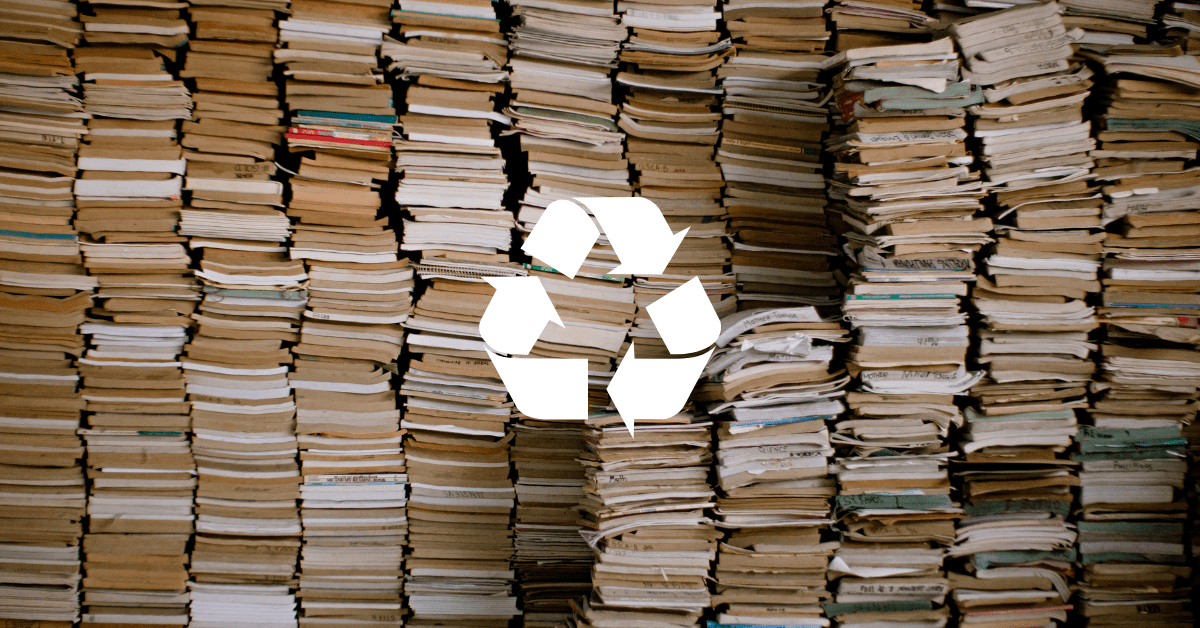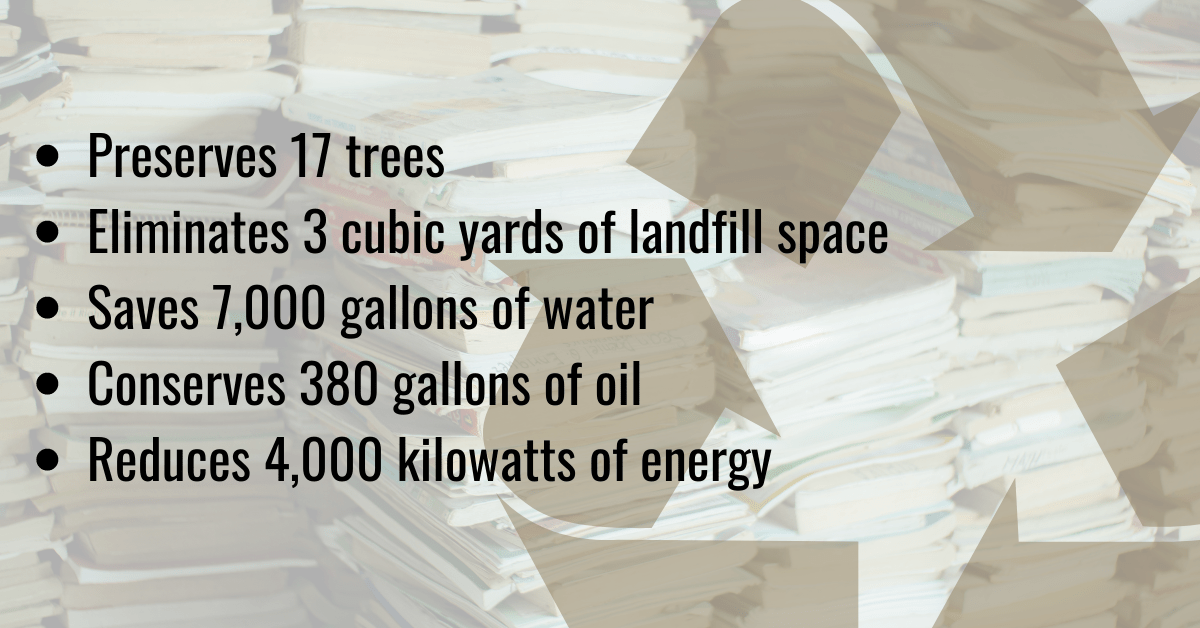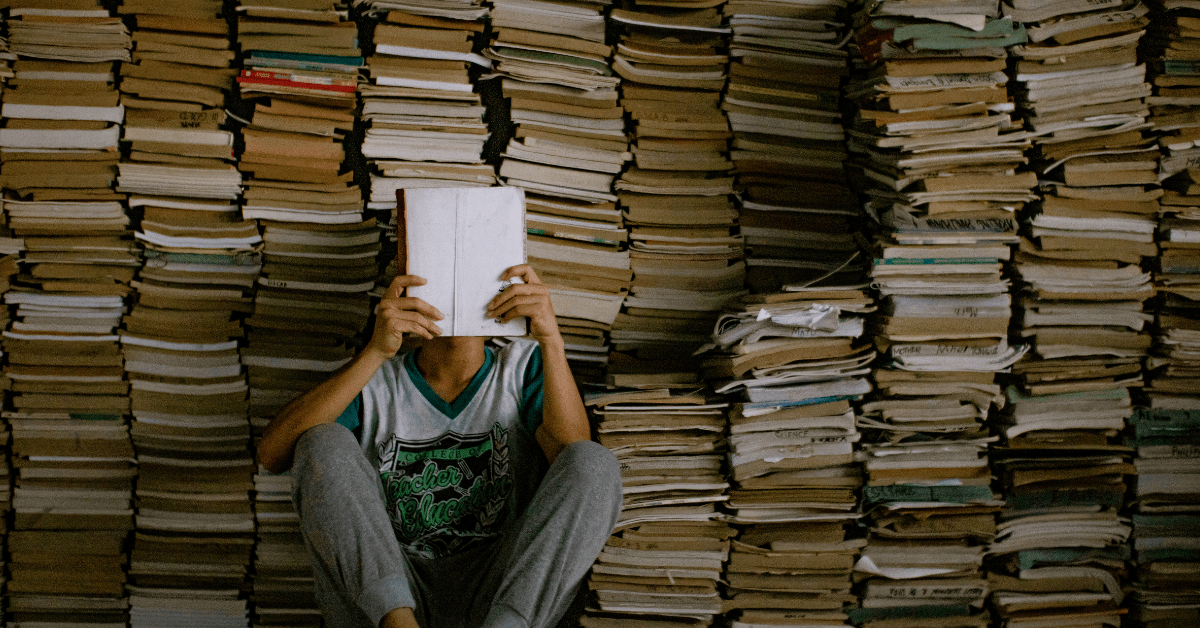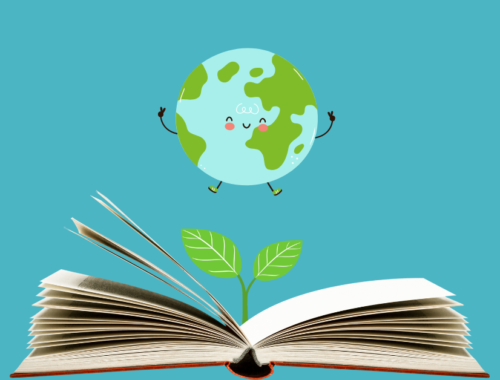
If you’ve recently cleaned out your closets and bookshelves and have found yourself with some stacks of old textbooks, novels, and other old reads, you may be tempted to throw your old books in the trash. But not so fast. There are lots of eco-friendly ways to recycle or upcycle your old reading material to breathe new life into old pages and to keep paper waste out of landfills.
From the best places to resell books (how to find the value of your old books) to the top tips for recycling textbooks and more, read on for a complete guide on the best ways to recycle books in 2024. It may help you make a little extra spending cash, and you can rest easy in the knowledge that your old books will be put to good use.
Why Recycle Books?
Recycling your books has so many benefits. It reduces landfill waste, helps to conserve natural resources and can even earn you a bit of money too.
If you need more reasons to choose recycling, keep in mind that every single ton of paper that gets recycled:
That’s a lot of benefits!
What’s more, recycled paper reduces the need to cut down more trees for wood pulp. Today, it’s estimated that only 33% of paper pulp is sourced from recycled paper. However, by increasing the number of books that get recycled, you’ll also boost the amount of recycled paper pulp that can be used to create new paper goods.
Beyond that, recycling books can also be used to raise money for important causes. And, if you hate waste, it can be helpful to know that your old books will be put to good use.
How to Recycle Books in 2024
Recycling rules may change occasionally, and the best sites to donate books may vary too. We’ve compiled the following list to help you find the most up-to-date information about how to recycle books in 2024; this way, you won’t have to throw away books. From where to recycle books to the best places to sell them, you’ll find everything you need right here to get rid of thousands of books.
Sell Your Books
One easy way to declutter your bookshelf and make a bit of extra cash is to sell your books on websites like BookScouter. Simply look up your book’s ISBN number into the helpful search bar, and you’ll receive a list of online vendors who are willing to pay the top dollar for your used books. After that, all that’s left to do is print out your prepaid shipping label, mail your books to the vendor of your choosing and wait to receive your payment.
While BookScouter is a wonderful resource for newer books and textbooks, if you have older antique or vintage books without ISBN numbers, you may want to try eBay or AbeBooks instead. These websites specialize in older and out of print books, so they are a great resource for anyone with an older library collection.
Depending on how old your textbooks are, you may also be able to sell them back to your local college campus bookstore. That means that, if you’re a current student, you can dramatically reduce the costs of your textbooks by selling your books back at the end of the semester.
@bighausbri Make money selling textbooks! #UltaBeautyatTarget #TalkCurlyToMe #SmartfoodClub #makemoney #sidehustle
♬ original sound – BigHausBri
Donate Your Old Books
Once you’ve read an old book, there’s no need to throw it out. Instead, put it to good use by donating it to a charity of your choice.
One of the best places to donate books is a thrift store. Goodwill, Salvation Army, BetterWorldBooks and small local thrift stores are usually more than happy to accept gently used books and the proceeds from reselling them will help to support the charity. To find a local charity in your area, try out this locator.
Books and some educational magazines can also be donated to your local public school or library; however, it can help to call ahead and ask if they’re actively accepting donations. Some libraries hold annual book sales to raise funds for library programs and only accept book donations at particular times of the year.
Small local coffee shops and senior centers will often accept book donations. Organizations, like the AAUW, will often hold book sales to raise donations too. And, if you just need to get rid of a few books, you can always look for the nearest Little Free Library.

Give Them Away
While donating books to your local charity is one option, depending on where you live and your transportation options, you may have better luck giving your books away for free. Placing an ad on websites like Craigslist.com, Bunz.com, LetGo.com or Freecycle.org will usually generate a lot of interest. Listing your old books for free in local Facebook groups can help too.
If you live in an area with lots of foot traffic, you can also simply place your books on your front stoop or at the base of your driveway on a sunny afternoon. Add a “Free” sign to your setup and your neighbors will usually stop by to browse.
Upcycle Books
Crafters can find tons of inspiration with old, vintage and antique books. Browsing websites like Pinterest can help to inspire you on how to upcycle old books. To get you started, some popular projects to try include:
- Create an upcycled book wreath
- Make your own bookmarks and gift tags with book pages
- Fold some origami paper cranes
- Upcycle old books into homemade journals and sketchpads
- Hide clutter behind repurposed book spines

Recycle Your Old Books
While donating or reselling your books are greener options, if your books are not in the best condition or are quite old, you may want to consider recycling them. However, this should be the last option you consider, as it’s always better to find new ways to reuse old items if you can.
Like catalogs and phonebooks, books fall into the recycling category of “mixed paper,” which has a lower value than other recyclable goods, such as newspapers and corrugated cardboard. Nevertheless, most U.S. papermills will recycle old textbooks, hardcovers and softcovers.
Softcover books and magazines can generally be recycled as is without deconstructing them. However, to be safe, it’s usually best to remove the covers of any hardcover book prior to recycling as they may contain non-paper elements. Once you remove the binding of hardcover books and textbooks, they can simply be added to your curbside recycling bin along with any old paperbacks.
Additionally, keep in mind that any book that has gotten wet or moldy should be thrown away or burned as they have no value in the recycling market. Likewise, particularly aged books with brown or tan pages should be tossed too as they can’t be recycled.
If you need to find a book recycling center near you, this recycling locator can help!
Frequently Asked Questions
Can You Recycle Books?
Absolutely! Books are usually categorized as “mixed paper” for recycling purposes. Just remember that you may need to remove the covers of hardback books first as they may contain non-paper elements.
How Do You Recycle Paperback Books?
Paperback books and magazines are usually categorized as “mixed paper” and can be added to your curbside recycling bin whole. If in doubt, you can always call your local recycling provider to doublecheck on specific rules in your area.
Can Hardcover Books Be Recycled?
Depending on your local recycling program, hardcover books may be able to be recycled as-is; however, it’s usually best to remove the covers before placing them in your curbside bin.
Can Textbooks Be Recycled?
Textbooks are generally treated like hardcover books during the recycling process, so it’s best to remove any hardcovers from your textbooks prior to recycling.
Why Can’t Wet Books Be Recycled?
When books get wet it can change the paper’s fiber, making it stiffer. Additionally, paper mills are less inclined to pay money for wet books because of the added water weight.
Summary
Used books once were frequently thrown in the trash, but times are changing and there are so many other ways to reuse your reads. From recycling your paperbacks to donating or selling your collectible books, there are plenty of ways to declutter your book shelves and help the environment while you do so. Paper waste can clog up our landfills and lead to the needless use of valuable natural resources, like trees, water and oil. But when we recycle books, we choose a better option that is eco-friendly and often easier on our wallets too.
While we hope you found the tips included in this guide helpful, if you’re still looking for more ways to reduce your impact, other great green solutions include borrowing books from your local library, choosing to buy only secondhand books or downloading your favorite reads on your e-reader. Or, if you want to meet other readers, try out a local or online book swap and get new books for free.





